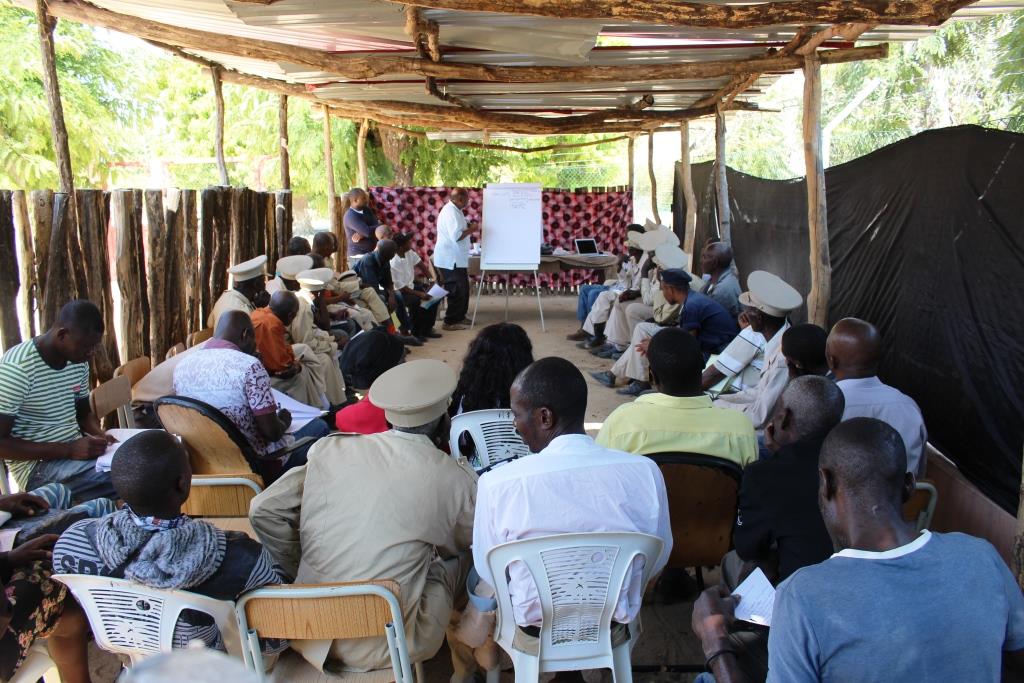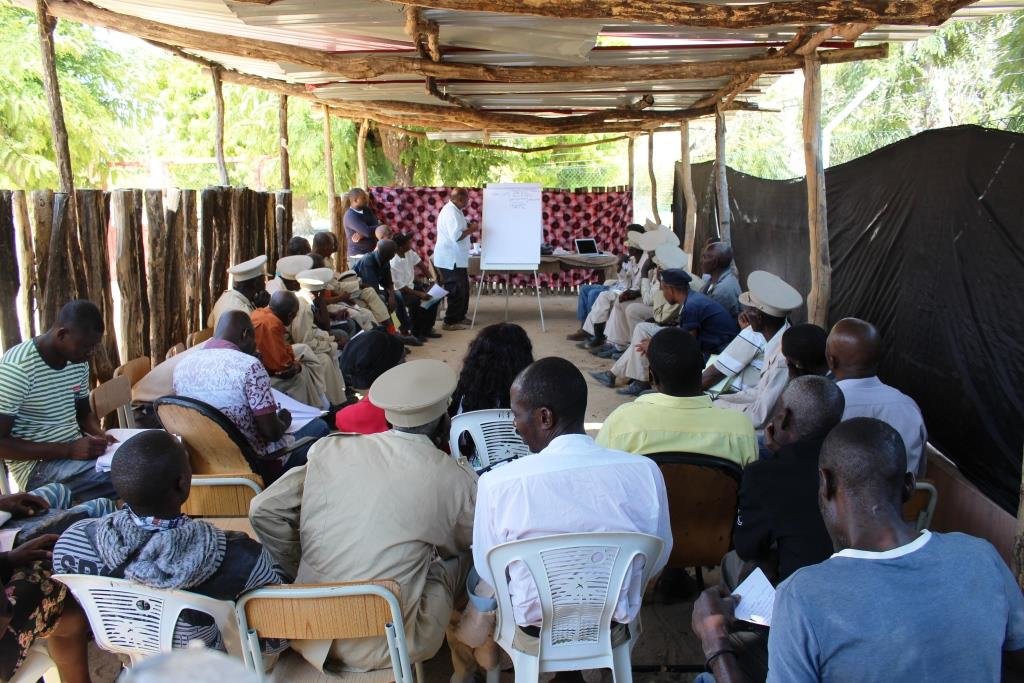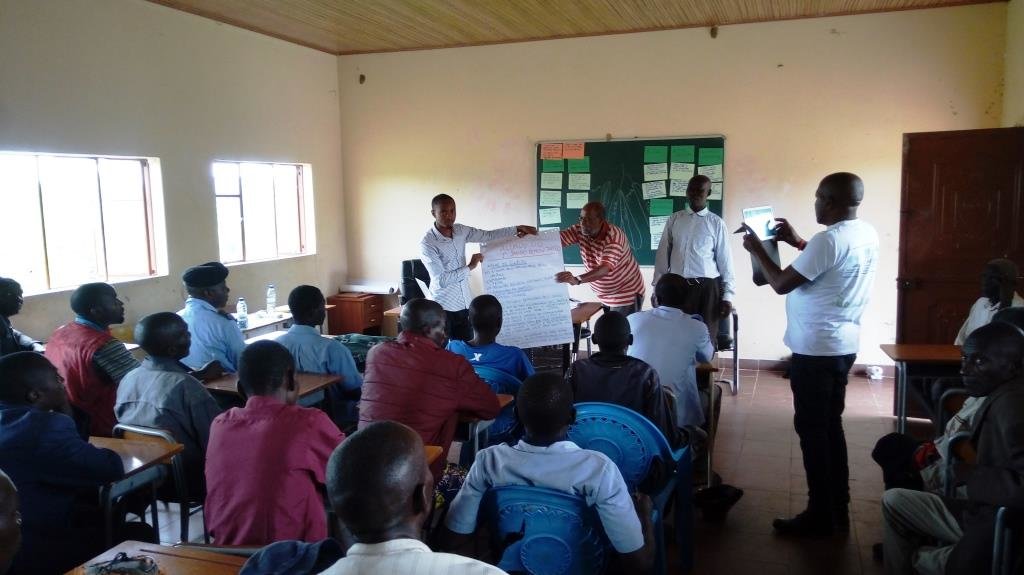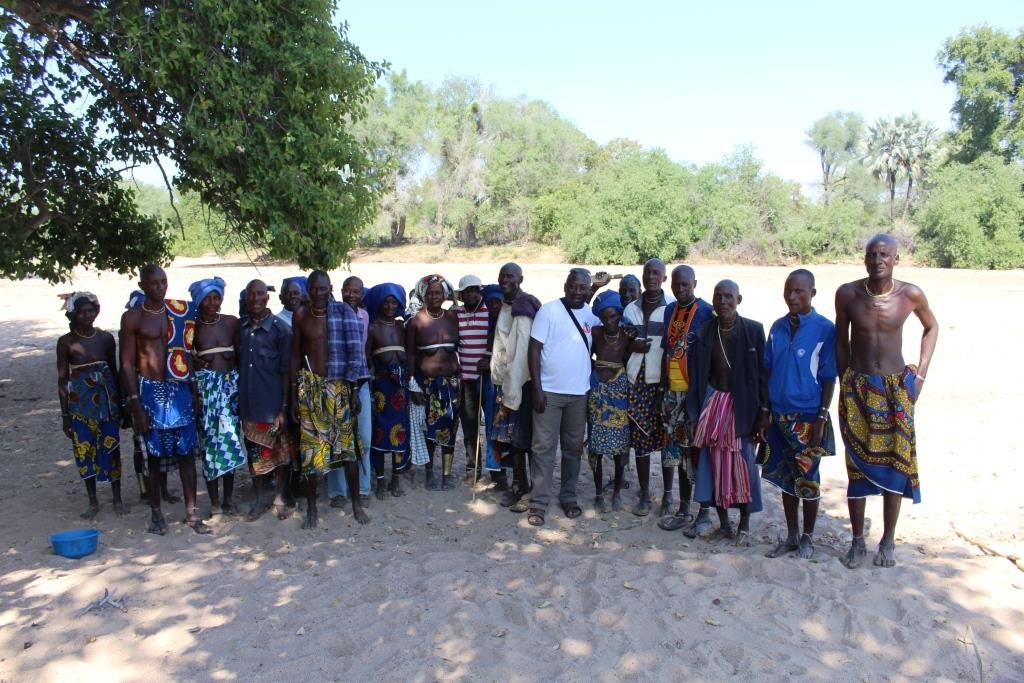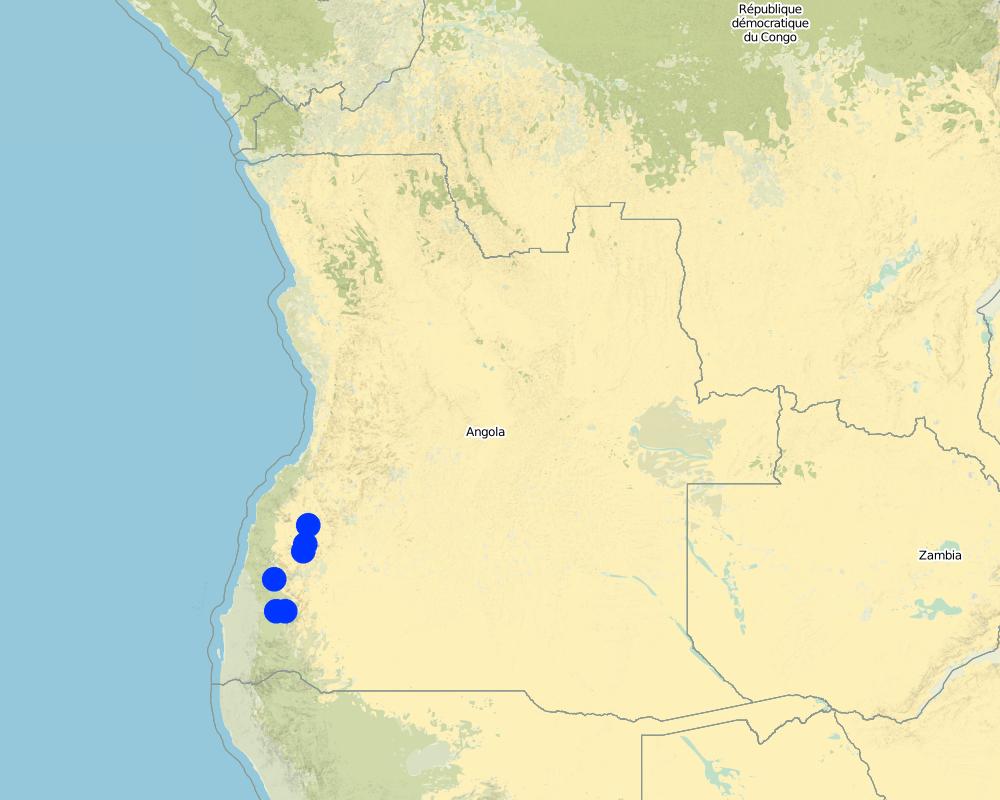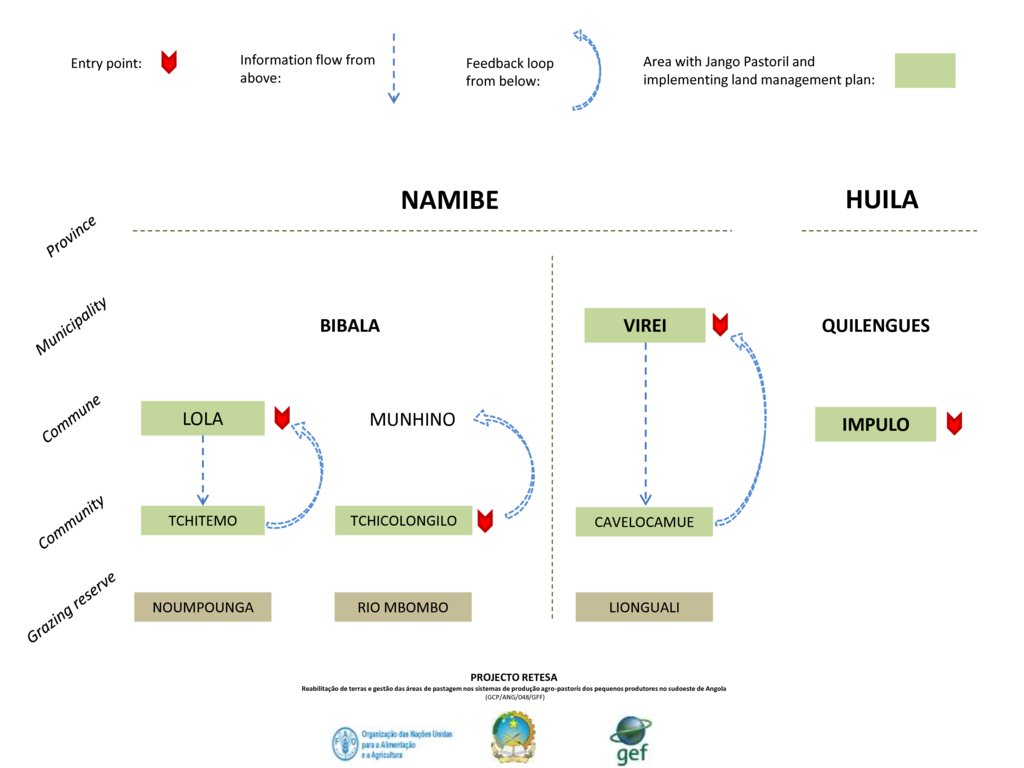Restoration of traditional pastoral management forums [ແອນໂກລາ]
- ການສ້າງ:
- ປັບປູງ:
- ຜູ້ສັງລວມຂໍ້ມູນ: Nicholas Euan Sharpe
- ບັນນາທິການ: David Tarrason, Txaran Basterrechea
- ຜູ້ທົບທວນຄືນ: Rima Mekdaschi Studer
Jangos Pastoris
approaches_3173 - ແອນໂກລາ
- ສະຫຼຸບສັງລວມຢ່າງທັງໝົດທີ່ເປັນ PDF
- ສັງລວມເປັນບົດ PDF ເພື່ອສັ່ງພິມ
- ສັງລວມເປັນບົດ ຢູ່ໃນ browser
- ບົດສະຫຼຸບ ສະບັບເຕັມ (ບໍ່ມີແບບຟອມ)
- Restoration of traditional pastoral management forums: Jan. 29, 2018 (inactive)
- Restoration of traditional pastoral management forums: Feb. 16, 2018 (inactive)
- Restoration of traditional pastoral management forums: July 12, 2018 (inactive)
- Restoration of traditional pastoral management forums: Nov. 2, 2021 (public)
ເບິ່ງພາກສ່ວນ
ຂະຫຍາຍທັງໝົດ ຍຸບທັງໝົດ1. ຂໍ້ມູນທົ່ວໄປ
1.2 ລາຍລະອຽດ ການຕິດຕໍ່ ຂອງບຸກຄົນທີ່ຊັບພະຍາກອນ ແລະ ສະຖາບັນ ການມີສ່ວນຮ່ວມ ໃນການປະເມີນຜົນ ແລະ ເອກະສານ ຂອງວິທີທາງ
ຜູ້ຊ່ຽວຊານ ດ້ານການຄຸ້ມຄອງ ທີ່ດິນແບບຍືນຍົງ:
ຊື່ຂອງໂຄງການ ທີ່ອໍານວຍຄວາມສະດວກ ໃນການສ້າງເອກກະສານ ຫຼື ປະເມີນດ້ານແນວທາງ (ຖ້າກ່ຽວຂ້ອງ)
Reabilitação de terras e gestão das áreas de pastagem nos sistemas de produção agro-pastoris dos pequenos produtores no sudoeste de Angola (RETESA)ຊື່ຂອງ ສະຖາບັນການຈັດຕັ້ງ ທີ່ອໍານວຍຄວາມສະດວກ ໃນການສ້າງເອກກະສານ ຫຼື ປະເມີນແນວທາງ (ຖ້າກ່ຽວຂ້ອງ)
FAO Angola (FAO Angola) - ແອນໂກລາ1.3 ເງື່ອນໄຂ ຂອງການນໍາໃຊ້ເອກກະສານຂໍ້ມູນ ຂອງ WOCAT
ເມື່ອໃດທີ່ໄດ້ສັງລວມຂໍ້ມູນ (ຢູ່ພາກສະໜາມ)?
21/12/2017
ຜູ້ສັງລວມ ແລະ ບັນດາຜູ້ຕອບແບບສອບຖາມ ຍອມຮັບໃນເງື່ອນໄຂ ການນໍາໃຊ້ຂໍ້ມູນເອກະສານ ທີ່ສ້າງຂື້ນ ໂດຍຜ່ານ ອົງການ WOCAT:
ແມ່ນ
2. ພັນລະນາ ແນວທາງການຄຸ້ມຄອງນໍາໃຊ້ດິນແບບຍືນຍົງ
2.1 ການອະທິບາຍ ໂດຍຫຍໍ້ ຂອງວິທີທາງ
The transhumance pastoral communities of Southern Angola traditionally held gatherings of chieftains and community leaders to discuss and manage commonly held pastoral resources; however, the conflicts of the last century led to the breakdown in traditional governance and the majority of the traditional management systems were abandoned. The RETESA Project has supported their recovery as a way to reduce land degradation and improve local livelihoods.
2.2 ການອະທິບາຍ ລາຍລະອຽດ ຂອງວິທີທາງ
ການອະທິບາຍ ລາຍລະອຽດ ຂອງວິທີທາງ:
The Approach was developed and implemented through the RETESA Project “Land rehabilitation and rangelands management in smallholders agro-pastoral production systems in south western Angola”, which is a project owned and implemented by the Ministry of Environment of the Government of Angola with technical and methodological assistance from The Food and Agriculture Organization of the United Nations (FAO) and financed by the Global Environmental Found (GEF).
From an early stage, the RETESA Project identified 'management' as the most effective tool to improve pastoral livelihoods and to reduce land degradation over large areas of land. However, the management terms and concepts used in conventional western cultures were difficult to convey to the pastoral communities and communication of the needs and methods of proper grazing management were not fully understood and led to confusion. After struggling initially with these challenges, the project technicians responsible for rangeland improvement and rehabilitation began the investigate the traditional management systems in place before the armed conflicts took place and found that they adapted to modern rangeland management theory and practice and had a rich vocabulary which described in detail the timing and movements of the herds. Rather than teach a new way of viewing the natural world, the project's objective became one of reinstitutionalising these lost systems and recuperating what was in the communities' words 'the ways of our elders'. In order to provide an underlying methodological basis which guided the process, the Green Negotiated Territorial Development (GreeNTD) methodology was introduced and used to negotiate the terms and agreements of the 6 management plans created and implemented through the process.
In essence, the role of the traditional management systems was to keep the animals in more remote, mountainous areas during the rainy season, the only time of year when water is available in these areas, and slowly bring them back to the lowland, river plains during the dry season. This simple system also allowed for rangeland recovery and rest and for agriculture to be practiced on the lowlands during the rainy season without the threat of intrusion by livestock, something which is a constant source of conflict within the communities. The periods of 'recovery and rest' of the different areas also meant that important grasses and forage plants could grow, produce seed and multiply, something which was not occurring under previous management, where the animals were free to roam where they wished, returning to the same areas day after day and reducing ground cover to a bare minimum.
The modern discussion forums, or 'Jangos', are still traditional affairs run by traditional authorities and representatives from the communities, but they have adapted to include local Administrations and their technicians, as well as veterinarians, church leaders, NGOs, ranchers and farmers, so as to involve a broader range of stakeholders. The addition of these stakeholders and their involvement and approval of the decisions that come out of the forums are seen as key to the survival and effectiveness of the management plans implemented.
2.3 ຮູບພາບຂອງແນວທາງ
2.5 ປະເທດ / ເຂດ / ສະຖານທີ່ບ່ອນທີ່ແນວທາງໄດ້ຖືກນໍາໃຊ້
ປະເທດ:
ແອນໂກລາ
ພາກພື້ນ / ລັດ / ແຂວງ:
Province of Namibe and Huila
ຂໍ້ມູນເພີ່ມເຕີມຂອງສະຖານທີ່:
Municipalities of Bibala, Virei and Quilengues
Map
×2.6 ວັນທີເລີ່ມຕົ້ນ ແລະ ສິ້ນສຸດ ການຈັດຕັ້ງປະຕີບັດ ວິທີທາງ
ສະແດງປີຂອງການເລີ່ມຕົ້ນ:
2015
ຖ້າຫາກບໍ່ຮູ້ຈັກປີທີ່ແນ່ນອນ, ໃຫ້ປະມານຄາດຄະເນ ເອົາມື້ທີ່ໄດ້ເລີ່ມຈັດຕັ້ງປະຕິບັດ ວິທີທາງ:
ຕໍ່າກວ່າ 10 ປີ ຜ່ານມາ (ມາເຖິງປະຈຸບັນ)
ຄວາມຄິດເຫັນ:
The Project held its first Jango in December of 2015 and a total of 14 Jangos had been celebrated by the end of the project in April 2018.
2.7 ປະເພດຂອງແນວທາງ
- The approach relies on a combination of Traditional Inputs and the RETESA Project support
2.8 ເປົ້າໝາຍ / ຈຸດປະສົງຫຼັກ ຂອງການຈັດຕັ້ງປະຕິບັດ ວິທີທາງ
Establish Jango Pastoril as institutions in strategic areas and use GreeNTD methodology to develop and implement 6 natural resource management plans that address the causes of land degradation and improve production and local livelihoods.
2.9 ເງື່ອນໄຂອໍານວຍ ຫຼື ຂັດຂວາງການປະຕິບັດຂອງເຕັກໂນໂລຢີ / ເຕັກໂນໂລຢີການນໍາໃຊ້ຕາມແນວທາງ
ສັງຄົມ / ວັດທະນະທໍາ / ມາດຕະຖານ ແລະ ຄຸນຄ່າທາງສາສະໜາ
- ອໍານວຍ
There is a clear understanding of the benefits of recuperating the traditional social structures and management systems.
- ເຊື່ອງຊ້ອນ
Current cultural norms and socio-polictical systems hinder the recuperation of the traditional systems as they originally were; therefore, adaptations should be made to make them viable under current conditions.
ມີຄວາມສາມາດ / ເຂັ້າເຖິງຊັບພະຍາກອນດ້ານການເງິນ ແລະ ການບໍລິການ
- ເຊື່ອງຊ້ອນ
The project ends in April 2018, whereby the Jangos must be self-sufficient and self-operating. Given the current economic crisis, this will be a challenge.
ການກໍ່ຕັ້ງສະຖາບັນ
- ອໍານວຍ
Most of the Municipal governments and community leaders involved have invested in the approach and wish to continue with the forums.
- ເຊື່ອງຊ້ອນ
Pastoral, nomadic livestyles are seen as a threat to education and prosperity by some institutions operating in the country, and the forums could be seen as a way of preserving pastoral culture.
ການຮ່ວມມື / ການປະສານງານຂອງຜູ້ກ່ຽວຂ້ອງ
- ອໍານວຍ
The pastoral communities are fully aware of the land degradation and challenges they face and see the Jango Pastoril forums as a way to address these challenges.
- ເຊື່ອງຊ້ອນ
Communication has improved through the forum structure, though collaboration within communities for common benefit is still on the whole uncommon and could threaten the sustainability of the plans agreed upon by the forums. Some communities also fear that improvements in land productivity or infrastructure could lead to land being seized by more powerful actors.
ກ່ຽວກັບກົດໝາຍ (ສິດນໍາໃຊ້ດິນ, ສິດນໍາໃຊ້ນໍ້າ)
- ເຊື່ອງຊ້ອນ
Land and water rights were not addressed during the forums and are still unclear in the majority of places these forums are operating. The land management plans were based on maintaining the 'status quo' currently operating in the area.
ນະໂຍບາຍ
- ອໍານວຍ
The RETESA Project has succeeded in presenting traditional livestock management and transhumance movements in a positive light and is working with the Angolan Government to improve policies directed at livestock and herder movement throughout the transhumance migration routes, at community, regional and national levels.
- ເຊື່ອງຊ້ອນ
Pastoral cultures are still seen by many in power as a threat to education and economic prosperity.
ການປົກຄອງທີ່ດິນ (ການຕັດສິນໃຈ, ການປະຕິບັດ ແລະ ຂໍ້ບັງຄັບ)
- ເຊື່ອງຊ້ອນ
There still remains much to be done in the area of Land Goverance, from decision-making, implementation and especially enforcement.
ຄວາມຮູ້ກ່ຽວກັບການຄຸ້ມຄອງ ທີ່ດິນແບບຍືນຍົງ, ການເຂົ້າເຖິງການສະໜັບສະໜູນ ທາງດ້ານວິຊາການ
- ເຊື່ອງຊ້ອນ
Very little is known about SLM and technical support is lacking at a community and municipal levels.
ຕະຫຼາດ (ໃນການຊື້ວັດຖຸດິບ, ຂາຍຜະລິດຕະພັນ) ແລະ ລາຄາ
- ເຊື່ອງຊ້ອນ
The more traditional tribes rarely sell their animals to local markets, leading critics to claim that their way of life contributes little to the local or national economies.
ວຽກ, ມີກໍາລັງຄົນ
- ອໍານວຍ
There is a vast pool of young people able to work.
- ເຊື່ອງຊ້ອນ
Manual labour is most often carried out by the women of the family, while those under 18 are responsible for caring for the animals and following them on their daily search for pasture and water.
3. ການມີສ່ວນຮ່ວມ ແລະ ບົດບາດຂອງພາກສ່ວນທີ່ກ່ຽວຂ້ອງທີ່ໄດ້ມີສ່ວນຮ່ວມ
3.1 ຜູ້ມີສ່ວນຮ່ວມ ໃນວິທີທາງ ແລະ ພາລະບົດບາດ ຂອງເຂົາເຈົ້າ
- ຜູ້ນໍາໃຊ້ດິນໃນທ້ອງຖິ່ນ / ຊຸມຊົນທ້ອງຖິ່ນ
Originally it was just the community chiefs and respected livestock producers who took part in the Jango Pastoril meetings, though the modern version also includes Administrators and their staff, Administrative technicians, veterinarians, ranchers, church leaders, NGOs and farmers.
Given that its the local land users and communities who manage the land on a daily basis, it is their role to fully understand the issues being debated and how the new management plans will affect them. This is usually done through a community Jango Pastoril forum run by the Project and traditional leaders who participate in the Municipal Forums, with the support of the local Administrations. In the community Jango Pastoril, the decisions taken at a Muncipal level are presented, opinions are expressed and the plans are modified or agreed upon. Community feedback is then presented by the traditional leaders at the next Municipal Jango Pastoril where it is recorded and taken into consideration, with the necessary adaptations being introduced.
- ອົງການຈັດຕັ້ງ ພາຍໃນຊຸມຊົນ
Agropastoral Farmer Field School (APFS) Facilitatores and Members.
Representatives from the Agricultural Development Iniciatives.
Local Church Representatives.
The community based organisations participate in the discussions and speak for those they represent. Many times they are often the ones who support the Administrations in the communication or implementation of the decisions made in the forums.
- ຜູ້ຊ່ຽວຊານ ການນຄຸ້ມຄອງ ທີ່ດິນແບບຍືນຍົງ / ທີ່ປຶກສາດ້ານກະສິກໍາ
FAO national and international Consultants.
Administrative agricultural and livestock technicians
Veterinarians and Animal Health Workers.
Provide technical support to discussions and provide feedback on local issues.
- ອົງການຈັດຕັ້ງ ທີ່ບໍ່ຂື້ນກັບລັດຖະບານ
Local and National NGOs.
Their role will most likely depend on the objectives of the participant NGO, but often lines of collaboration are easily established.
- ພາກເອກະຊົນ
Representitives from local ranches and private holdings.
Often the owners are far from the land, and send their local managers to participate, though they have often have little decision-making capacity. However, their presence and opinion should be sought.
- ອໍານາດ ການປົກຄອງທ້ອງຖິ່ນ
Municipal and Communal Administrations and their representittives.
Co-coordinate the organisation and logistics of the Jango Pastoril forums. Participate as a stakeholder in the meetings and give feedback and administrative approval of the decisions taken. The Municipal and Communal Administrations usually have the final word on any decisions made so they must actively participate in the meetings.
- ອົງການຈັດຕັ້ງ ສາກົນ
Project 'RETESA', FAO Angola.
FAO Angola was responsible for supporting the Angolan Government in its design and execution of the Global Environment Funded 'Project RETESA'.
ຖ້າຫາກມີຫຼາຍພາກສ່ວນທີ່ເຂົ້າຮ່ວມ ໃຫ້ລະບຸ ອົງການທີ່ເປັນຫຼັກ ໃນການຈັດຕັ້ງປະຕິບັດ:
Project 'RETESA', FAO Angola was the lead agency, though plans are for the Municipal Forums to be self-suficient in 2018.
3.2 ການມີສ່ວນຮ່ວມຂອງຜູ້ນໍາໃຊ້ທີ່ດິນໃນທ້ອງຖິ່ນ / ຊຸມຊົນທ້ອງຖິ່ນໃນໄລຍະທີ່ແຕກຕ່າງກັນຂອງແນວທາງ
| ການລວບລວມ ເອົາຜູ້ນໍາໃຊ້ດິນ ໃນທ້ອງຖິ່ນ / ຊຸມຊົນທ້ອງຖິ່ນ | ໃຫ້ລະບຸ ຜູ້ໃດທີ່ມີສ່ວນຮ່ວມ ໃນແຕ່ລະກິດຈະກໍາ? | |
|---|---|---|
| ການເລີ່ມຕົ້ນ / ແຮງຈູງໃຈ | ການຮ່ວມມື | The first meetings and forums were organised by the Municipal Administrations and the Retesa Project, picking up from previous attempts at organising discussion forums to manage commonly held natural resources. |
| ການວາງແຜນ | ການຮ່ວມມື | Once Jango Pastoril were well established, the decision making process was transferred to them, with technical support being provided by the SLM specialists and with the Municipal Administrators having final word. |
| ການປະຕິບັດ | ການຮ່ວມມື | The implementation of the decisions made was based on their type and complexity and often depended on input and action from various stakeholders. Where possible, external support in the form of technical knowledge, materials, food, machinery, etc. were organised to support the agreed upon activities and works. |
| ຕິດຕາມກວດກາ / ການປະເມີນຜົນ | ການຊ່ວຍເຫຼືອຈາກພາຍນອກ | At the current stage, monitoring and evaluation has been carried out by the RETESA Project and the supporting Administrations. In the best case scenario, monitoring and evaluation would be carried out by the Jango Pastoril themselves, though external support would most likely be needed, at least until the process is well understood by the forum participants. |
3.3 ແຜນວາດ (ຖ້າມີ)
ການອະທິບາຍ:
As the initial processes had different entry points and acted at different administrative levels, a graphic representation of the process can be seen in the flow chart provided. Readers are asked to focus on the entry points and how each situation developed, rather than focus on the specific names of the areas.
The Approach has overseen the creation of 5 Jango Pastoril, each with their own contexts and stakeholders, which are highlighted in the flow chart in green. By introducing and implementing the GreeNTD methodology, the 5 Jango Pastoril also debated and approved land management plans with administrative and community support, which in some cases allowed for the creation of large grazing reserves. The 6th and final plan is the combination of the 5 plans into an encompassing plan which serves a large part of the principal transhumance migration route.
ຜູ້ຂຽນ:
Projecto RETESA 2018
3.4 ການຕັດສິນໃຈກ່ຽວກັບການຄັດເລືອກເຕັກໂນໂລຢີຂອງການຄຸ້ມຄອງທີ່ດິນແບບຍືນຍົງ / ເຕັກໂນໂລຢີ
ລະບຸ ຄົນທີ່ຕັດສິນໃຈ ກ່ຽວກັບການຄັດເລືອກຂອງ ເຕັກໂນໂລຢີ / ເຕັກໂນໂລຢີ ຈະໄດ້ຮັບການປະຕິບັດ:
- ພາກສ່ວນກ່ຽວຂ້ອງທັງໝົດ, ເປັນສ່ວນໜຶ່ງ ຂອງວິທີທາງແບບມີສ່ວນຮ່ວມ
ອະທິບາຍ:
FAO representatives facilitated the Forums, though decision-making and proposals came largely from the Forum participants themselves. SLM specialists did make clear their opinions and helped the group reach viable decisions on the use and adequacy of the technologies to be implemented.
Specify on what basis decisions were made:
- ປະສົບການສ່ວນບຸກຄົນ ແລະ ຄວາມຄິດເຫັນ (ທີ່ບໍ່ເປັນເອກກະສານ)
- The traditional management system used before the conflicts of the XX century provided important inputs to the final land management plans.
4. ການສະໜັບສະໜູນທາງດ້ານວິຊາການ, ການສ້າງຄວາມສາມາດ, ແລະ ການຈັດການຄວາມຮູ້.
4.1 ການສ້າງຄວາມສາມາດ / ການຝຶກອົບຮົມ
ຜູ້ນໍາໃຊ້ທີ່ດິນ ຫຼື ພາກສ່ວນກ່ຽວຂ້ອງອື່ນໆ ໄດ້ຮັບການຝຶກອົບຮົມບໍ່?
ແມ່ນ
- Forum participants
ຖ້າເປັນໄປໄດ້, ໃຫ້ລະບຸເພດ, ອາຍຸ, ສະຖານະພາບ, ຊົນເຜົ່າ, ແລະ ອື່ນໆ:
Principaly male (livestock is male centred enterprise in the area, except for chickens and pigs), 40 to 60 years of age, leader/authority within the community and their is generally a mix of tribal backgrounds. Administrative representatives were more variable in gender, background and ethnicity.
ຮູບແບບຂອງການຝຶກອົບຮົມ:
- ກອງປະຊຸມ
ໃນຫົວຂໍ້:
Animal health and nutrition; native pasture and rangeland management; water management & illnesses (both human and animal); integrated landscape design and planning; development and governance of Community Management Forums.
ຄວາມຄິດເຫັນ:
The first 2 Forums celebrated in each area opened with 2 hours of training and education. After the trainings sessions, the current livestock and rangeland management model was discussed and the members of the Forum proposed different ways of adapting current management to improve both grassland/rangeland health, as well as addressing current social conflicts arising from animal production issues (children not attending school to care for animals; livestock invading agricultural crops; animal theft; lack of administrative support). The following Forum sessions do not usually include training, but centre on consolidating previous agreements, developing management plans and assigning task to be carried out, with supervision from local authorities and Municipal representitives.
4.2 ການບໍລິການໃຫ້ຄໍາປຶກສາ
ເຮັດຜູ້ໃຊ້ທີ່ດິນມີການເຂົ້າເຖິງການບໍລິການໃຫ້ຄໍາປຶກສາ?
ແມ່ນ
ລະບຸວ່າການສະໜອງ ການບໍລິການ ໃຫ້ຄໍາປຶກສາ:
- ໃນພື້ນທີ່ຂອງຜູ້ນໍາໃຊ້ດິນ
ອະທິບາຍ / ຄວາມຄິດເຫັນ:
The Jango Pastoril have a limited ability to provide advisory services, but they can be used by participants to find and meet those who can provide assistance.
4.3 ສະຖາບັນການສ້າງຄວາມເຂັ້ມແຂງ (ການພັດທະນາອົງການຈັດຕັ້ງ)
ສະຖາບັນ ໄດ້ຮັບການສ້າງຕັ້ງຂື້ນ ຫຼື ໄດ້ຮັບການສ້າງຄວາມເຂັ້ມແຂງ ໂດຍການຈັດຕັ້ງປະຕິບັດ ວິທີທາງບໍ່?
- ມີ, ພໍສົມຄວນ
ລະບຸ ທາງສະຖາບັນ ໄດ້ສ້າງຄວາມເຂັ້ມແຂງ ໃນລະດັບໃດ (ຫຼາຍ):
- ທ້ອງຖິ່ນ
ອະທິບາຍ ສະຖາບັນການຈັດຕັ້ງ, ພາລະບົດບາດ ແລະ ໜ້າທີ່ຮັບຜິດຊອບ, ສະມາຊິກ ແລະ ອື່ນໆ.
Creation of the Jango Pastoril as an institution in its own right has led to important benefits. Local, communal and municipal institutions have also been strengthened and provided with a direct link to the pastoral communities.
ລະບຸ ປະເພດ ຂອງສະໜັບສະໜູນ:
- ການສ້າງຄວາມອາດສາມາດ / ການຝຶກອົບຮົມ
ໃຫ້ລາຍລະອຽດເພີ່ມເຕີມ:
The Jango Pastoril approach, underlain with the GreeNTD Methodology, stands as an example for involving locals in decision-making processes around commonly held natural resources. Local and Municipal authorities have benefited by experiencing and overseeing much of the process.
4.4 ຕິດຕາມກວດກາ ແລະ ປະເມີນຜົນ
ການຈັດຕັ້ງປະຕິບັດ ວິທີທາງ ໄດ້ມີການປະເມີນຜົນ ແລະ ຕິດຕາມບໍ?
ແມ່ນ
ຄວາມຄິດເຫັນ:
The idea is that the regurally scheduled Jango Pastoril are to act as monitoring bodies for the land management plans, evaluating results and taking action to correct mistakes or adapt to new conditions. However, for the most part it will be the Muncipal authorities who decide whether the process is working and whether to continue with them or not.
ຖ້າແມ່ນ, ເອກກະສານສະບັບນີ້ ແມ່ນໄດ້ນໍາໃຊ້ເຂົ້າໃນການຕິດຕາມ ແລະ ປະເມີນຜົນບໍ່?
ບໍ່ແມ່ນ
4.5 ການຄົ້ນຄວ້າ
ນີ້້ແມ່ນສ່ວນໜຶ່ງ ການຄົ້ນຄວ້າ ຂອງວິທີທາງບໍ່?
ບໍ່ແມ່ນ
5. ການສະໜັບສະໜູນທາງດ້ານການເງິນ ແລະ ອຸປະກອນຈາກພາຍນອກ
5.1 ງົບປະມານປະຈໍາປີ ສໍາລັບວິທີທາງ ຂອງການຄຸ້ມຄອງ ທີ່ດິນແບບຍືນຍົງ
ສະແດງງົບປະມານ ປະຈໍາປີ ສໍາລັບອົງປະກອບ ຂອງວິທີທາງ ການຄຸ້ມຄອງ ທີ່ດິນແບບຍືນຍົງ ເປັນໂດລາສະຫະລັດ :
2200.00
ຖ້າຫາກບໍ່ຮູ້ຈັດງົບປະມານທີ່ແນ່ນອນ ແມ່ນໃຫ້ປະມານເອົາ:
- < 2,000
ຄໍາເຫັນ (ຕົວຢ່າງ: ແຫຼ່ງຂໍ້ມູນຫຼັກ ຂອງການສະໜອງທຶນ / ຜູ້ໃຫ້ທຶນທີ່ສໍາຄັນ):
It costs about US $500 to organise and fund a Muncipal Forum, about US $200 for a Community Forum. Theoretically, their should be around 2 Muncipal Forums and 6 Community Forums per year per Municipality.
5.2 ການສະໜັບສະໜູນ ທາງດ້ານການເງິນ / ອຸປະກອນ ສະໜອງໃຫ້ແກ່ຜູ້ນໍາທີ່ດິນ
ຜູ້ນໍາໃຊ້ດິນ ໄດ້ຮັບການສະໜັບສະໜູນ ທາງດ້ານ ການເງິນ / ອຸປະກອນ ໃນການຈັດຕັ້ງປະຕິບັດ ເຕັກໂນໂລຢີບໍ?
ບໍ່ແມ່ນ
5.3 ເງິນສົມທົບສໍາລັບການນໍາໃຊ້ສະເພາະປັດໃຈຂາເຂົ້າໃນການຜະລີດກະສິກໍາ (ລວມທັງແຮງງານ)
- ບໍ່ມີ
ຖ້າແຮງງານ ຂອງຜູ້ນໍາໃຊ້ດິນ ໄດ້ຮັບການສະໜັບສະໜູນ ປັດໃຈຂາເຂົ້າ, ແມ່ນບໍ່:
- ການອາສາ
ຄວາມຄິດເຫັນ:
Breakfast, Lunch and Drinks were provided by the Project RETESA during the Municipal Forums (as many had travelled far to attend). Breakfast and Drinks were provided at the Community Forums by the Project.
5.4 ສິນເຊື່ອ
ໄດ້ປ່ອຍສິນເຊື່ອ ສະໜອງໃຫ້ພາຍໃຕ້ ວິທີການສໍາລັບກິດຈະກໍາ ການຄຸ້ມຄອງ ທີ່ດິນແບບຍືນນຍົງບໍ່?
ບໍ່ແມ່ນ
5.5 ສິ່ງຈູງໃຈ ຫຼື ເຄື່ອງມືອື່ນໆ
ການສົ່ງເສີມ ຈັດຕັ້ງປະຕິບັດ ເຕັກໂນໂລຢີ ໃນການຄຸ້ມຄອງ ດິນແບບຍືນຍົງ ໄດ້ສະໜອງສິ່ງກະຕຸກຊຸກຍູ້ບໍ່?
ບໍ່ແມ່ນ
6. ວິເຄາະຜົນກະທົບ ແລະ ສັງລວມບັນຫາ
6.1 ຜົນກະທົບຂອງແນວທາງ
ວິທີທາງ ຊ່ວຍຊຸກຍູ້ ຜູ້ນຳໃຊ້ທີ່ດິນທ້ອງຖີ່ນ, ໃນການປັບປຸງ ການມີສ່ວນຮ່ວມ ຂອງຜູ້ທີ່ກ່ຽວຂ້ອງ ບໍ່?
- ບໍ່
- ມີ, ໜ້ອຍໜຶ່ງ
- ມີ, ພໍສົມຄວນ
- ມີ, ຫຼາຍ
In most cases, there are no community forums or public spaces for locals to voice their opinions. By creating the Jango Pastoril forums, participant land users and their representatives were able to voice their concerns and propose solutions.
ການນໍາໃຊ້ ວິທີທາງ ດັ່ງກ່າວນີ້ ສາມາດເປັນຫຼັກຖານ ທີ່ສະໜັບສະໜູນ ໃຫ້ການຕັດສິນໃຈໄດ້ບໍ່?
- ບໍ່
- ມີ, ໜ້ອຍໜຶ່ງ
- ມີ, ພໍສົມຄວນ
- ມີ, ຫຼາຍ
Experience in the area has shown that presenting 'scientific evidence' to communities with little formal education can produce interesting interpretations and consequences. Most decisions in pastoral communities are based on past experience, social convenctions and emotions. However there is significant collective memory that has allowed for the evidence of land degradation and climate change to become clear and better decisions are being made.
ການຈັດຕັ້ງປະຕິບັດ ວິທີທາງ ສາມາດຊ່ວຍຜູ້ນໍາໃຊ້ທີ່ດິນ ໃນການຈັດຕັ້ງປະຕິບັດ ແລະ ບໍາລຸງຮັກສາ ເຕັກໂນໂລຢີ ການຄຸ້ມຄອງ ທີ່ດິນແບບຍືນຍົງໄດ້ບໍ?
- ບໍ່
- ມີ, ໜ້ອຍໜຶ່ງ
- ມີ, ພໍສົມຄວນ
- ມີ, ຫຼາຍ
yes, the approach did help land users implement and improve upon current practices. However, the Jango Pastoril forums were not created as a purely educational environment and they depended on the participants having enough experience and knowledge to provide adequate feedback and make proper decisions.
ການນໍາໃຊ້ ວິທີທາງ ສາມາດປັບປຸງ ການປະສານງານ ແລະ ຄ່າໃຊ້ຈ່າຍ ການຈັດຕັ້ງປະຕິບັດ ທີ່ມີປະສິດທິພາບ ຂອງການຄຸ້ມຄອງ ທີ່ດິນແບບຍືດຍົງໄດ້ບໍ່?
- ບໍ່
- ມີ, ໜ້ອຍໜຶ່ງ
- ມີ, ພໍສົມຄວນ
- ມີ, ຫຼາຍ
Coordination was improved at various public and administrative levels, though the forums as an institution are still in their ealry stage.
ການນໍາໃຊ້ ວິທີທາງ ສາມາດລະດົມ ຫຼື ປັບປຸງ ການເຂົ້າເຖິງຊັບພະຍາກອນ ການເງິນ ສໍາລັບການຈັດຕັ້ງປະຕິບັດ ການຄຸ້ມຄອງ ທີ່ດິນແບບຍືດຍົງໄດ້ບໍ່?
- ບໍ່
- ມີ, ໜ້ອຍໜຶ່ງ
- ມີ, ພໍສົມຄວນ
- ມີ, ຫຼາຍ
Funding has been sought for water point improvement works yet none has materialised to date.
ການນໍາໃຊ້ ວິທີທາງ ສາມາດປັບປຸງຄວາມຮູ້ ແລະ ຄວາມສາມາດຂອງຜູ້ນໍາໃຊ້ທີ່ດິນ ໃນການປະຕິບັດ ການຄຸ້ມຄອງ ທີ່ດິນແບບຍືດຍົງໄດ້ບໍ່?
- ບໍ່
- ມີ, ໜ້ອຍໜຶ່ງ
- ມີ, ພໍສົມຄວນ
- ມີ, ຫຼາຍ
As the first Jango Pastoril forums in each area did include 2 hours of education on proper rangeland and natural resource management, some knowledge and capacity building was part of the process.
ການນໍາໃຊ້ ວິທີທາງ ສາມາດປັບປຸງຄວາມຮູ້ ແລະ ຄວາມສາມາດ ຂອງພາກສ່ວນທີ່ກ່ຽວຂ້ອງໄດ້ບໍ່?
- ບໍ່
- ມີ, ໜ້ອຍໜຶ່ງ
- ມີ, ພໍສົມຄວນ
- ມີ, ຫຼາຍ
The exchange of points of view and communication between the different stakeholders improved the collective knowledge of traditional production systems and the challenges each group faces.
ການນໍາໃຊ້ ວິທີທາງ ສາມາດສ້າງຄວາມເຂັ້ມແຂງ ໃຫ້ສະຖາບັນການຈັດຕັ້ງ, ການຮ່ວມມື ລະຫວ່າງພາກສ່ວນທີ່ກ່ຽວຂ້ອງບໍ່?
- ບໍ່
- ມີ, ໜ້ອຍໜຶ່ງ
- ມີ, ພໍສົມຄວນ
- ມີ, ຫຼາຍ
The Jango Pastoril forums were the first organised events that brought these different stakeholders to the table to discuss key issues surrounding commonly held natural resources.
ການນໍາໃຊ້ ວິທີທາງ ສາມາດຫຼຸດຜ່ອນ ຂໍ້ຂັດແຍ່ງໄດ້ບໍ່?
- ບໍ່
- ມີ, ໜ້ອຍໜຶ່ງ
- ມີ, ພໍສົມຄວນ
- ມີ, ຫຼາຍ
The Jango Pastoril discussed and dealt with various sources of conflict in the local areas where they were held. In some cases, solutions were found and agreed upon; however, some conflicts were best left in the hands of the relevant authorities, though suggestions and proposals were gathered and presented to Administrative authorities present.
ການຈັດຕັ້ງປະຕິບັດ ວິທີທາງ ສາມາດສ້າງຄວາມເຂັ້ມແຂງ ທາງສັງຄົມ ແລະ ເສດຖະກິດບໍ່?
- ບໍ່
- ມີ, ໜ້ອຍໜຶ່ງ
- ມີ, ພໍສົມຄວນ
- ມີ, ຫຼາຍ
Pastoral herders often enjoy a certain amount of standing within their communities and the majority of the participants were elder male members of the communities. Women farmers and widows were often invited but were overall under-represented in the forums. This is clearly an area of improvement for future interventions.
ການຈັດຕັ້ງປະຕິບັດ ວິທີທາງ ສາມາດປັບປຸງ ຄວາມສະເໜີພາບ ຂອງບົດບາດ ຍິງຊາຍ ແລະ ສ້າງຄວາມເຂັ້ມແຂງໃຫ້ຜູ້ຍິງໄດ້ບໍ່?
- ບໍ່
- ມີ, ໜ້ອຍໜຶ່ງ
- ມີ, ພໍສົມຄວນ
- ມີ, ຫຼາຍ
Although a number of women hold high positions within the Provincial and Municipal governments and took part in the forum discussions as administrative representives, for the most part the participants in the forums were elderly men of standing.
ການຈັດຕັ້ງປະຕິບັດ ວິທີທາງ ສາມາດຊຸກຍູ້ ຜູ້ນໍາໃຊ້ທີ່ດິນທີ່ເປັນຊາວໜຸ່ມ / ຄົນລຸ້ນໃໝ່ ໃນການຄຸ້ມຄອງ ທີ່ດິນແບບຍືນຍົງໄດ້ບໍ?
- ບໍ່
- ມີ, ໜ້ອຍໜຶ່ງ
- ມີ, ພໍສົມຄວນ
- ມີ, ຫຼາຍ
A small percentage of young males took part in the forums. As they mostly care for the livestock, it would be good to improve their participation rates in future events.
ການຈັດຕັ້ງປະຕິບັດ ວິທີທາງ ສາມາດປັບປຸງ ປະເດັນການຖືຄອງທີ່ດິນ / ສິດທິໃນການນໍາໃຊ້ທີ່ດິນ ທີ່ເຊື່ອງຊ້ອນໃນການຈັດຕັ້ງປະຕິບັດ ເຕັກໂນໂລຢີ ການຄຸ້ມຄອງ ທີ່ດິນແບບຍືນຍົງໄດ້ບໍ?
- ບໍ່
- ມີ, ໜ້ອຍໜຶ່ງ
- ມີ, ພໍສົມຄວນ
- ມີ, ຫຼາຍ
Land rights and tenure were not addressed either by the forums or the Project. The land management plans created and implemented maintained the 'status quo' currently operating in the area.
ການນໍາໃຊ້ ວິທີທາງ ໄດ້ປັບປຸງ ການຄໍ້າປະກັນສະບຽງອາຫານ ຫຼື ປັບປຸງໂຄສະນາການໄດ້ບໍ່?
- ບໍ່
- ມີ, ໜ້ອຍໜຶ່ງ
- ມີ, ພໍສົມຄວນ
- ມີ, ຫຼາຍ
The land management plans should produce improved animal production rates and reduce livestock invasions of crops, leading to improved food security and nutrition.
ການຈັດຕັ້ງປະຕິບັດ ວິທີທາງ ສາມາດປັບປຸງ ການເຂົ້າເຖິງຕະຫຼາດໄດ້ບໍ?
- ບໍ່
- ມີ, ໜ້ອຍໜຶ່ງ
- ມີ, ພໍສົມຄວນ
- ມີ, ຫຼາຍ
Sale of animals is still a sensitive issue in the area and this topic did not form part of the discussions.
ການນໍາໃຊ້ ວິທີທາງ ໄດ້ປັບປຸງ ການເຂົ້າເຖິງນໍ້າ ແລະ ສາຂາພິບານໄດ້ບໍ່?
- ບໍ່
- ມີ, ໜ້ອຍໜຶ່ງ
- ມີ, ພໍສົມຄວນ
- ມີ, ຫຼາຍ
Water harvesting and access was a common topic and a list of priority areas and works was prepared and presented to Communal and Municipal Administrations, leading to a number of access and storage improvement activities.
ການນໍາໃຊ້ ວິທີທາງ ໄດ້ປັບປຸງ ການນໍາໃຊ້ແຫຼ່ງພະລັງງານ ແບບຍືນຍົງຫຼາຍຂື້ນບໍ່?
- ບໍ່
- ມີ, ໜ້ອຍໜຶ່ງ
- ມີ, ພໍສົມຄວນ
- ມີ, ຫຼາຍ
Charcoal production and its effects on the area was raised and debated a number of times but no agreements or solutions were found.
ການຈັດຕັ້ງປະຕິບັດ ວິທີທາງ ສາມາດສ້າງຄວາມອາດສາມາດໃຫ້ຜູ້ນໍາໃຊ້ດິນ ໃນການປັບຕົວ ຕໍ່ການປ່ຽນແປງດິນຟ້າອາກາດ / ຫຼດຜ່ອນຄວາມສ່ຽງທາງໄພພິບັດໄດ້ບໍ? :
- ບໍ່
- ມີ, ໜ້ອຍໜຶ່ງ
- ມີ, ພໍສົມຄວນ
- ມີ, ຫຼາຍ
The creation of large scale grazing reserves and institutions that allow for debate and adaptation of management to increasing changes should lead to an improved capacity to adapt to changes in the climate.
ການນໍາໃຊ້ ວິທີທາງ ໄດ້ປັບປຸງ ການຈ້າງງານ, ໂອກາດ ໃນການສ້າງລາຍຮັບບໍ່?
- ບໍ່
- ມີ, ໜ້ອຍໜຶ່ງ
- ມີ, ພໍສົມຄວນ
- ມີ, ຫຼາຍ
6.2 ແຮງຈູງໃຈຫຼັກຂອງຜູ້ນໍາໃຊ້ທີ່ດິນໃນການປະຕິບັດການຄຸ້ມຄອງທີ່ດິນແບບຍືນຍົງ
- ການຜະລິດເພີ່ມຂຶ້ນ
Recuperating large grazing reserves and planning animal movements to allow for rangeland recovery and growth will bring about increased production. What remains to be seen is if the managment plans are respected and enforced.
- ຫຼຸດຜ່ອນດິນເຊື່ອມໂຊມ
Improper livestock management is the leading cause of land degradation in the area and the Jango Pastoril and the managment plans created deal directly with this problem.
- ພາສີ ແລະ ຄວາມເຊື່ອຖື, ສົມບັດສິນທໍາ
By reinstating the traditional systems, support and understanding for the 5 land management plans was easily appropriated and communicated. The adaptation of the Jango Pastoril to its modern form was also appropriated with ease.
- ການຫຼຸດຜ່ອນຂໍ້ຂັດແຍ່ງ
The Impulo management plan dealt directly with 2 conflicts that were of concern to the local communities, which were invasion of crops by livestock, the closing of the traditional water point access points by new cropping land. The plan created was more an communal ordinance and required that livestock be accompanied by a herder during the day and corraled at night and that those who encroached on traditional livestock routes and water access points would be given 1 growing season to open the routes and access points.
6.3 ຄວາມຍືນຍົງຂອງກິດຈະກໍາວິທີທາງ
ຜູ້ນໍາໃຊ້ ທີ່ດິນ ສາມາດສືບຕໍ່ ການຈັດຕັ້ງປະຕິບັດ ຜ່ານວິທີທາງໄດ້ບໍ່ (ໂດຍປາດສະຈາກ ການຊ່ວຍເຫຼືອ ຈາກພາກສ່ວນພາຍນອກ)?
- ແມ່ນ
ຖ້າ ໄດ້, ອະທິບາຍເຫດຜົນ:
Given coordination and willingness, the communities and Administrations have the resources needed to continue on with Approach as it has been , albeit without the technical and logistical support given by the project until this point. In any case, the process has shown to be well appropriated.
6.4 ຈຸດແຂງ / ຂໍ້ດີ ຂອງວິທີທາງ
| ຈຸດແຂງ / ຂໍ້ດີ / ໂອກາດໃນການນໍາໃຊ້ທີ່ດິນ |
|---|
| Through the Jango Pastoril, land users now have available an instrument to voice opinions and bring attention to issues affecting pastoral communities and the natural resources they depend on. |
| It brings people in contact with decision-makers and others who play important roles in community affairs. |
| The Jango Pastoril also serve as a source of information, for example, information on water and pasture availability, on livestock theft, on the Administrations point of view on key issues and priorities, on new projects or programmes coming into the area, etc. |
| ຈຸດແຂງ / ຈຸດດີ / ໂອກາດ ຈາກທັດສະນະຂອງຜູ້ປ້ອນຂໍ້ມູນ ຫຼື ບຸກຄົນສຳຄັນ |
|---|
| The Jango Pastoril brings together a diverse and important group of stakeholders who normally wouldn't meet with the objective of addressing rangeland management and livestock issues. In doing so, it brings attention to a number of serious problems affecting the base of local livelihoods and promotes understanding and collaboration between those present and the communites they represent. |
| It is one of the few ways to directly deal with the root cause of land degradation, which in this case is the cause is poor land management. It was management processes which produced the land degradation, and land management should be the tool used to address the problems. The land management plans created through the Jango Pastoril hopefully return things to a process by which the land was productive and supported a wide array of life. |
| It creates an institution whose formalities and objectives are easily understood and appropriated by locals. This institution deals with issues that are of a common concern and that should be receiving more attention than they are. |
| The Jango Pastoril and the commonly agreed land management plans they produced add weight to the argument for maintaining the commons for public use and grazing. By entering into agreements and producing management plans that improve local resources, the communities can show unity and argue against those that want to divide and privatise land in the area. |
6.5 ຈຸດອ່ອນ / ຂໍ້ເສຍຂອງແນວທາງ ແລະ ວິທີການແກ້ໄຂໃຫ້ເຂົາເຈົ້າ
| ຈຸດອ່ອນ / ຂໍ້ເສຍ / ຄວາມສ່ຽງໃນມູມມອງຂອງຜູ້ນໍາໃຊ້ທີ່ດິນ | ມີວິທີການແກ້ໄຂຄືແນວໃດ? |
|---|---|
| It can require a lengthy trip and an overnight stay for participants that have to travel from isolated communities. | The Jangos were scheduled at the same time as other key events and meetings, so as to reduce costs and travel. The Municipal and Communal Administrations usually found accomodation for those that had to stay the night. |
| The issues discussed and decisions made will have outcomes that will affect some land users. Obviously, there are those that are benefiting from the current situation and they will try and ensure that things remain as they are. | The GreeNTD methodology discussed earlier has a well established system for involving all stakeholders, assessing their motivations and publically producing a viable plan that addresses key issues. |
| The withdrawal of logistical and technical support by the RETESA Project will affect the Jango Pastoril forums. | Approach other projects coming into the area and find other funding opportunities to continue to support the growth of the forums. |
| ຈຸດອ່ອນ ຫຼື ຂໍ້ເສຍ ຫຼື ຄວາມສ່ຽງ ໃນມຸມມອງຂອງ ຜູ້ສັງລວມຂໍ້ມູນ ຫຼື ບັນດາຜູ້ຕອບແບບສອບຖາມ | ມີວິທີການແກ້ໄຂຄືແນວໃດ? |
|---|---|
| The Jango Pastoril do little to improver the situation of the disadvantaged members of the population, or to improve gender equality. In other words, they perpetuate current cultural power bases. | Explore ways with the Jangos of bringing in more farmers and women into the discussions. Or create 'Jango Campones' which deal with cropping issues and land rights. |
| The Jango Pastoril do little to address land ownship issues or land rights. | It should be the Jango that asks for help on this issue, but the Jango Pastoril have proven to be in favour of the rangelands being open and available for community grazing. |
| Enforcement of laws and regulations is not always easy in such isolated territory. | Establish protocols and systems for dealing with offenders that are known to the local authorities and support all attempts to communicate the plans to land users and invite their feedback. |
7. ເອກກະສານອ້າງອີງ ແລະ ຂໍ້ມູນການເຊື່ອມໂຍງ
7.1 ວິທີການ / ແຫຼ່ງຂໍ້ມູນ
- ການໄປຢ້ຽມຢາມພາກສະໜາມ, ການສໍາຫຼວດພາກສະໜາມ
- ການສໍາພາດ ຜູ້ນໍາໃຊ້ທີ່ດິນ
7.3 ການເຊື່ອມຕໍ່ກັບຂໍ້ມູນທີ່ກ່ຽວຂ້ອງທີ່ສາມາດໃຊ້ອອນໄລນ໌
ຫົວຂໍ້ / ພັນລະນາ:
FAO in Action: Using indigenous knowledge to reverse land degradation in Angola.
URL:
http://www.fao.org/in-action/using-indigenous-knowledge-to-reverse-land-degradation-in-angola/en/
ຂໍ້ມູນການເຊື່ອມຕໍ່ ແລະ ເນື້ອໃນ
ຂະຫຍາຍທັງໝົດ ຍຸບທັງໝົດການເຊື່ອມຕໍ່
ບໍ່ມີຂໍ້ມູນການເຊື່ອມຕໍ່
ເນື້ອໃນ
ບໍ່ມີເນື້ອໃນ


